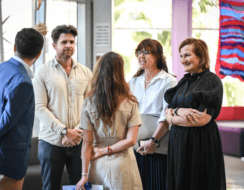06 Feb 2018
NewsFrom the CEO — Multiculturalism and “African gang crime”
On the flip side, we see worrying instances of race-baiting and media sensationalism that target minority groups, like the recent storm that broke over Victoria’s African-Australian community.
Newspaper headlines in January were dominated by reports of an escalation of activity involving so-called “African gang crime” in Melbourne. Various politicians weighed in on the issue, which gave plenty of material for news-short journalists over the traditionally quiet summer reporting period.
Much of this coverage was overhyped and sensationalised. In at least one instance, the outlet reporting on an African “gang flare-up” had actually instigated the conflict in question.
The political dog-whistling and hysterical media coverage ignored the facts — and the experts. Victorian Police have repeatedly hosed down reports of a crime crisis and have in fact called on media to stop using inflammatory language like “gangs”.
According to police, what we are actually seeing is an increase in public disorder and misbehaviour — some of which involves youth from the African-Australian community.
Proportionally, Sudanese immigrants are over-represented in crime statistics (people born in Sudan make up just 0.1 per cent of Victoria’s total population while they make up 1 per cent of the offender population).
Yet the majority of offenders in Victoria remain people born in Australia (nearly 72 per cent). And the overall crime rate in Victoria is actually declining. But you wouldn’t know that from perusing the headlines published across the country over the past month — headlines that ignore the shades of grey in this complex situation.
The Victorian Police have called for calm, pointing to the growing racially motivated threats being made against members of the African community.
Leaders from Melbourne’s Sudanese community have also come out in force for their community. One particularly positive outcome has been the spontaneous reclaiming of the Twitter hashtag #africangangs. The hashtag began trending nationally, filled with images that counter the narrative about violence and gangs — images of celebrations, family gatherings, university graduations, professionals at work and other happy moments involving African-Australian community members.
What has been overlooked in the metaphorical dogpiling on the African-Australian community is the multitude of benefits multiculturalism has brought, and continues to bring, to our country.
Just consider new research from CGU showing that one in three Australian small businesses is run by people who migrated to our country. This equates to at least 620,000 migrant-owned businesses across the country, employing around 1.4 million people.
Or look at SSI’s Community Innovation Fund. In January, we allocated $50,000 to fund six projects that support refugee communities in south-west Sydney.
What is unique about this funding allocation is that all initiatives selected are driven by the communities they support. An intensive consultation process was undertaken with the community to directly inform the fund’s selection criteria. It aimed to understand the community’s hopes and challenges and provide a narrative about what kind of community its members want to live in.
Take, for example, the Chaldean League of NSW’s technology support project. This aims to help newly arrived refugees to develop the skills, knowledge and confidence to navigate online forms in English for services that are crucial to their everyday lives, such as online banking or Centrelink.
The project was developed by Raghda Aziz, a volunteer caseworker with the Chaldean League. Raghda arrived in Australia in 2011 with her family after fleeing persecution in Iraq. She has seen how simple mistakes on forms can affect people’s lives and is now known for her expertise and willingness to support newly arrived members of the community.
Raghda is not a unique example. While the everyday social, economic and cultural contributions new arrivals make to our communities do not make the headlines, they do form a critical part of our country’s multifaceted multicultural identity.


